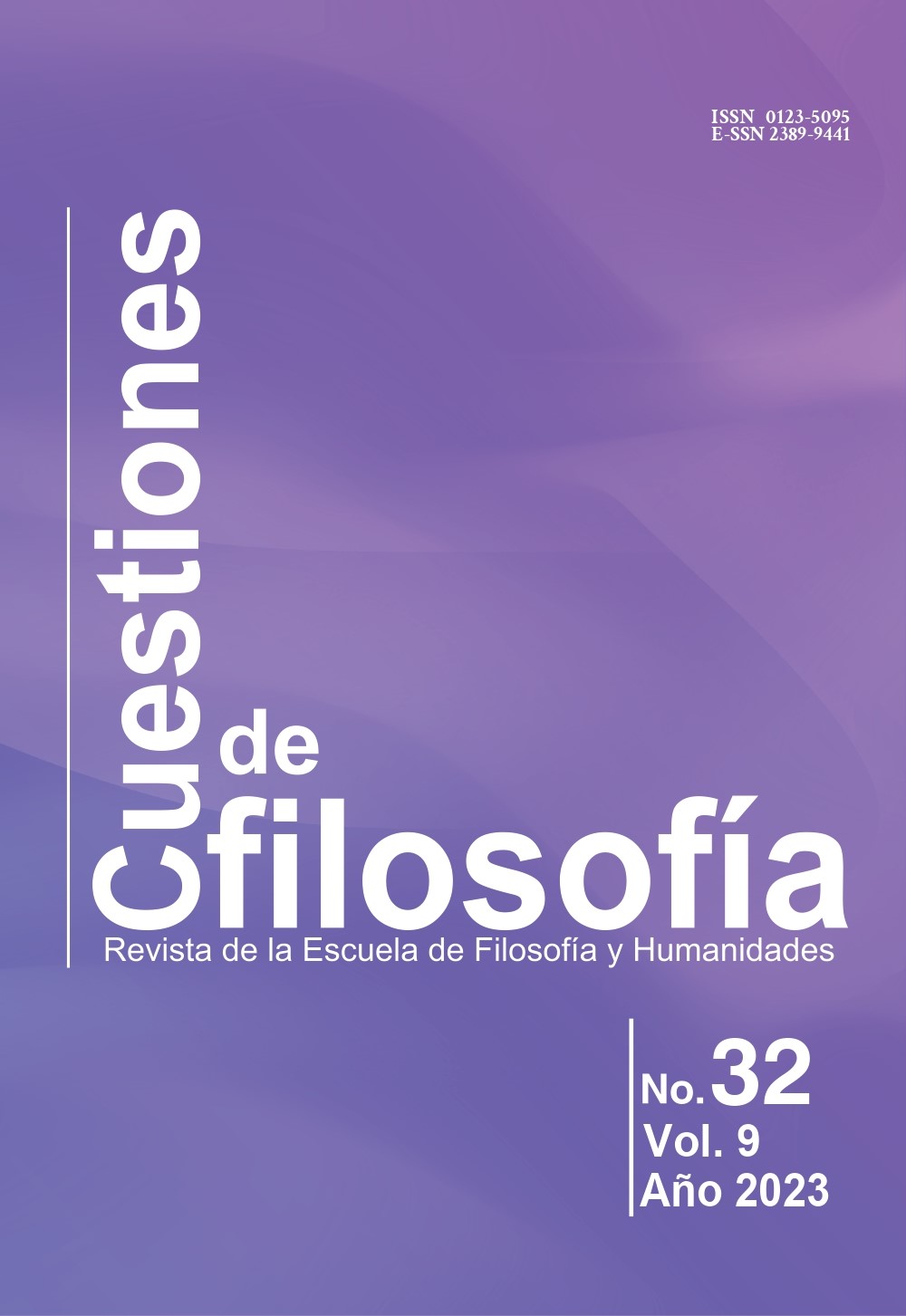Against objectivism and psychocriticism. The hermeneutic epistemology of the human sciences

Abstract
This article intends to make a contribution to the foundation of the epistemology of the human sciences. This contribution tries to find out the function of subjective lived experience and how it affects the objectivity of humanistic knowledge. This work appeals to poetry as an example of the object of the humanities, which think from the vital experience, but must save, at the same
time, the objectivity of meaning. Abstract objectivism as the epistemological basis of the humanities is as harmful as radical subjectivism, so that the danger threatening the epistemology of the human sciences today is depersonalization. The humanities have to reconcile personal experience and objective meaning.
Keywords
lived experience, objectivity, human sciences, epistemology, poetry
References
- Agamben, G. (1982). Il linguaggio e la morte. Torino: Einaudi.
- Bachelard, G. (1961). La poétique de l’espace. Paris: PUF.
- Bernard-Donals, M. F. (1998). The practice of theory: rhetoric, knowledge, and pedagogy in the Academy. Cambridge: Cambridge University Press. DOI: https://doi.org/10.1017/CBO9780511585142
- Bollnow, O. F. (1962). Maβ und Vermessenheit des Menschen. Philosophische Aufsätze. Göttingen: Vandenhoeck & Ruprecht.
- Chaouli, M. (2021). Schlegel’s words, rightly used. Poetic critique. Encounters with art and literature (pp. 19-34). Berlin: De Gruyter. DOI: https://doi.org/10.1515/9783110688719-003
- Combe, D. (1996). La référence dédoublée: le sujet lyrique entre fiction et autobiographie. D. Rabaté (Ed.), Figures su sujet lyrique (pp. 40-63). Paris: PUF.
- Daston, L. (2014). Objectivity and impartiality. Epistemic virtues in the humanities. R. Bod (Ed.), The making of the humanities. Volume III. The modern humanities (pp. 27-41). Amsterdam: Amsterdam University Press. DOI: https://doi.org/10.1515/9789048518449-002
- Dilthey, W. (1978). Das Erlebnis, Die geistige Welt. Gesammelte Schriften VI (pp. 313-317). Stuttgart: Teubner.
- Dilthey, W. (1979a). Einleitung in die Geisteswissenschaften. Gesammelte Schriften I. Stuttgart: Teubner.
- Dilthey, W. (1979b). Der Aufbau der geschichtlichen Welt in den Geisteswissenschaften. Gesammelte Schriften VII. Stuttgart: Teubner.
- Dilthey, W. (2005). Goethe und die dichterische Phantasie. Das Erlebnis und die Dichtung. Gesammelte Schriften XXVI (pp. 113-172). Göttingen: Vandenhoeck & Ruprecht. DOI: https://doi.org/10.13109/9783666303289.113
- Eckermann, J. P. (1999). Gespräche mit Goethe. Sämtliche Werke. Band XII. Frankfurt a. M: Deutscher Klassik.
- Esterhammer, A. (2002). The romantic ode. A. Esterhammer (Ed.), Romantic poetry (pp. 143-162). Amsterdam: Johns Benjamins. DOI: https://doi.org/10.1075/chlel.xvii.11est
- Foucault, M. (1969). L’archéologie du savoir. Paris: Gallimard.
- Gadamer, H-G. (1990). Hermeneutik I. Wahrheit und Methode. Gesammelte Werke I. Tübingen: Mohr (Siebeck).
- Gadamer, H-G. (1993a). Ästhetik und Hermeneutik, Ästhetik und Poetik I. Kunst als Aussage. Gesammelte Werke VIII (pp. 1-8). Tübingen: Mohr (Siebeck).
- Gadamer, H-G. (1993b). Über den Beitrag der Dichtkunst bei der Suche nach der Wahrheit, Ästhetik und Poetik I. Kunst als Aussage. Gesammelte Werke VIII (pp. 70-79). Tübingen: Mohr (Siebeck).
- Gadamer, H-G. (1993c). Vorwort zur 2. Auflage [von Wahrheit und Methode], Hermeneutik II. Wahrheit und Methode. Gesammelte Werke II (pp. 437-448). Tübingen: Mohr (Siebeck).
- Gadamer, H-G. (1993d). Die Kontinuität der Geschichte und der Augenblick der Existenz. Hermeneutik II. Wahrheit und Methode. Gesammelte Werke II (pp. 133-145). Tübingen: Mohr (Siebeck).
- Gadamer, H-G. (1993e). Wort un Bild -so wahr, so seined. Ästhetik und Poetik I. Kunst als Aussage. Gesammelte Werke VIII (pp. 373-399). Tübingen: Mohr (Siebeck).
- Gadamer, H-G. (1993f). Die Aktualität des Schönen, Ästhetik und Poetik I. Kunst als Aussage. Gesammelte Werke VIII (pp. 94-142). Tübingen: Mohr (Siebeck).
- Goethe, J. W. (1996). Ein Wort für jungen Dichter. Sämtliche Werke XVIII.II (pp. 219-220). München: Hanser.
- Goethe, J. W. (2000). Aus meinem Leben. Dichtung und Wahrheit IX. München: Deutscher Taschenbuch.
- Gullón, R. (1960). Estudios sobre Juan Ramón Jiménez. Buenos Aires: Losada.
- Habermas, J. (1992). Erkenntnis und Interesse. Frankfurt a. M: Suhrkamp.
- Hamburger, K. (1977). Die Logik der Dichtung. München: Klett / Cotta.
- Hegel, G. W. F. (1986). Vorlesungen über die Ästhetik III. Werke XV. Frankfurt a. M: Suhrkamp.
- Heidegger, M. (1977a). Die Zeit des Weltbildes. Holzwege (GA 5) (pp. 75-113). Frankfurt a. M: Klostermann. DOI: https://doi.org/10.5771/9783465142362-75
- Heidegger, M. (1977b). Der Ursprung des Kunstwerkes. Holzwege (GA 5) (pp. 1-74). Frankfurt a. M: Klostermann. DOI: https://doi.org/10.5771/9783465142362-1
- Heidegger, M. (1996). Der Wille zur Macht als Kunst. Nietzsche I (GA 6.1) (pp. 1-22). Frankfurt a. M: Klostermann.
- Horacio (2008). Ars Poetica. Stuttgart: Reclam.
- Jakobson, R. (1987). Linguistics and Poetics. Language in Literature (pp. 62-94). Cambridge: Cambridge University Press.
- Kusch, M. (1995). Psychologism. A case study in the sociology of philosophical knowledge. London: Routledge.
- Nietzsche, F. (1980). Jenseits von Gut und Böse. KSA 5. Berlin: De Gruyter.
- Olson, P. R. (1983). La luz con el tiempo dentro: Ser y tiempo en la poesía de Juan Ramón Jiménez. Actas del Congreso Internacional del Centenario de Juan Ramón Jiménez. Tomo II (pp. 435-443). Huelva: Diputación de Huelva.
- Ortega y Gasset, J. (2004). Meditaciones del Quijote, Obras completas. Tomo I. Madrid: Taurus / Fundación Ortega.
- Quéma, A. (1999). The agon of modernism. Lewisburg: Bucknell University Press.
- Sloterdijk, P. (1988). Zur Welt kommen - Zur Sprache kommen. Frankfurt a. M: Suhrkamp.
- Steinmetz, G. (2021). Historicism and positivism in sociology. H. Paul y A. von Veldhuizen (Eds.), Historicism. A travelling concept (pp. 57-96). London: Bloomsbury. DOI: https://doi.org/10.5040/9781350121980.ch-003
- Stierle, H. (1997). Ästhetische Rationalität. München: Fink.
- Szuba, M. (2019). Contemporary scottish poetry and the natural world. Edinburgh: Edinburgh University Press. DOI: https://doi.org/10.3366/edinburgh/9781474450607.001.0001
- Unamuno, M. (1980). Del sentimiento trágico de la vida. Madrid: Espasa / Calpe.
- Wellek, R. (1979). Genre Theory, the Lyric, and Erlebnis. Discriminations: Further Concepts of Criticism (pp. 225-252). Yale University Press.